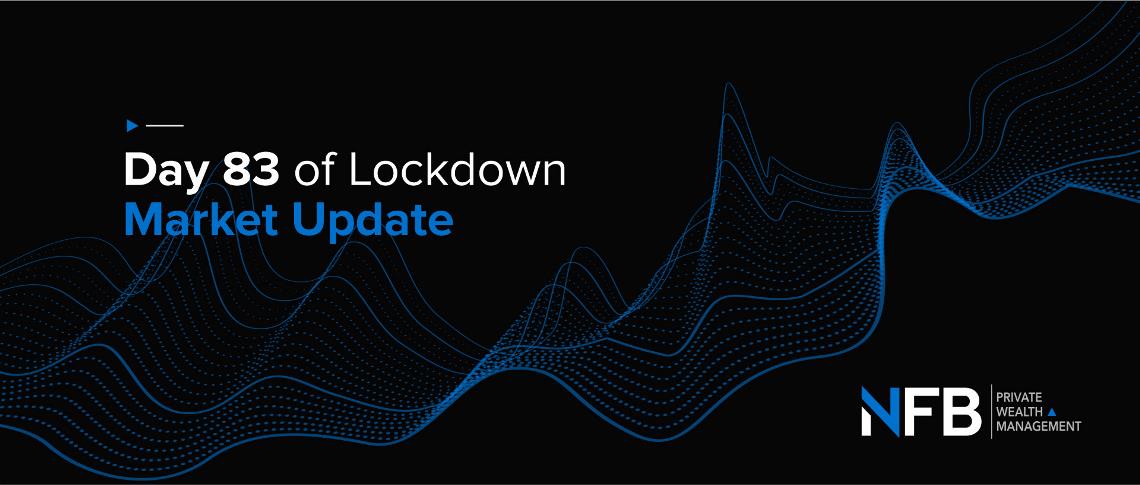Day 83 of Lockdown | Market Update
The twelfth and final in a series of weekly lockdown-inspired market commentaries; the next edition moving to a bi-weekly publication schedule.


We trust you enjoyed Youth Day yesterday and took advantage by taking Monday off as well; though long weekends have rather a different feel when experienced during lockdown. Two quick housekeeping items before we begin: now that we’re becoming accustomed (grudgingly?) to living and working in what feels like a state of near-permanent lockdown we’re adjusting the publication schedule of this email from weekly to bi-weekly. The next edition will be distributed on Monday the 29th of June and will come out every second week thereafter. The other housekeeping item is that with little to no change in the Nation’s lockdown alert level 3 status our business operations, too, are unchanged: safety protocols and a preference for digital interactions remain in force. Our Group’s Executive Committee is meeting this afternoon (Wednesday the 17th for clarity) to review this. Any changes to our operations will be communicated to you shortly thereafter.
Clearly much of the coronavirus-related news flow has been about an imminent second wave which, primarily, led to last week Thursday evening’s sell-off in American equities despite the US Federal Reserve’s (the Fed’s) commitment during the week to continued market-friendly monetary support policies (which arguably isn’t part of their mandate); from which Fed Chairman Jerome Powell specifically did not exclude more aggressive policies like yield curve control; like that implemented recently in Japan. This risk-off environment washed up on South African shores on Monday with the JSE selling off close to 3% and the 10-year nominal government bond ticking up toward 9.25%. The rand also shifted off its strengthening tack, moving back above 17 to the US dollar. Second wave fears appear well-founded (or perhaps its simply that the first wave is only cresting now as some argue) on the basis of a reemergence of COVID-19 in China with 100 new cases reported in Beijing and with American cities like Texas, Houston, looking to reimpose shelter-in-place orders. The situation in Brazil is increasingly dire with more than 800,000 confirmed positive cases, the world’s second most, and the experience in India is similarly alarming with more than 2,000 fatalities on Tuesday this week.
NFB Asset Management Commentary
All of the NFB Asset Management collective investment schemes (CIS’s, unit trusts) are in the top half or top quartile of their respective ASISA sectors on all relevant performance reporting periods except for the NFB Global Balanced Fund which is managed by NFB AM International and which is at about the 50th percentile of it’s respective sector; pulled down somewhat by a 10% allocation to global property which had been reduced in December last year from 15%.
Forthcoming trades include an allocation to a South African bond fund away from a South African cash-plus fund and away from a small allocation to a South African listed property fund for the Income Model Portfolios which should improve the forward yield of the Portfolio by 1 to 1.25% per annum on an after-costs basis whilst not materially increasing the risk. Though we do need to acknowledge that the pursuit of yield does not come risk-free. A similar trade for the NFB Ci Stable (and possibly the NFB Ci Managed) Fund is being considered given the recent tick upwards in South African bond yields; having done the first half of this trade toward the end of April.
Two areas we are watching closely: potential further equity market weakness related to fears of a second wave of COVID-19 and further rand strength; which we don’t believe will occur concurrently. It’s more likely that if equities come under pressure that the rand will weaken rather than strengthen. All of the NFB AM CIS’s are underweight in terms of equities and non-rand exposure so whilst negative movements won’t be welcome, the Portfolios are somewhat cautiously positioned. Feedback from NFB AM International’s Investment Committee has been that global equity exposure has regularly been trimmed back to 65% as markets have rallied and that further reductions may be forthcoming.
Next week Wednesday’s coronavirus stimulus-led budget from Finance Minister Tito Mboweni is a critical event though market expectations of meaningful detail are waning. It is most likely that the detail the market so desperately wants will only be made available during October’s regular Medium-Term Budget Policy Statement. If that is the case, we can reasonably expect yields on South African bonds to continue to tick upwards throughout this week and next. It, unfortunately, also makes it more likely that South Africa goes to the International Monetary Fund for assistance but not in the form of a covenant-lite emergency coronavirus loan but in the form of a more restrictive ordinary loan. Whilst the latter appears somewhat concerning it may prove to be a blessing in disguise as more restrictive terms and conditions may force the South African Government into fiscal policy reforms earlier and more extensively than would otherwise have been the case.
Finally, expect US-Sino trade relations to sour this week as Trump reads the headline reports that Chinese imports fell 17% whilst exports only fell 3%. Its almost inevitable he’ll tweet about this at some point this week, probably along the lines of the Chinese not holding up their end of the Phase I trade deal. That imports are measured in currency terms and not volume terms and were down largely because oil prices were down heavily during the reporting period will likely be ignored as a technicality. Exports on the other hand weren’t down as much because China is effectively the world’s manufacturer of PPE (personal protective equipment) which, too, will likely be ignored or rather unacknowledged as nation states aren’t likely to want to overtly announce their reliance on China as one path out of the pandemic. Expect all of this in an environment where another potential $1 trillion, likely including a second stimulus cheque issued directly to citizens, makes its way through the American legislature.
As always, our pack of weekly slides can be found here. Please do note though that the slides have been updated to yesterday’s market close but that the performance data presented in the body of this email is to last week Friday’s close.
Stay safe. Stay positive.
Market Data
| Asset Class | Last Week | Last Month | Last Year | Last 3 Years |
| Local Cash | 0,10% | 0,48% | 6,96% | 7,20% |
| Local Bonds | -1,48% | 0,05% | 4,64% | 7,12% |
| Local Property | -3,22% | 18,96% | -38,37% | -18,25% |
| Local Equity | -1,96% | 6,63% | -5,32% | 4,71% |
| Global Property | -4,79% | 13,12% | -13,75% | -0,10% |
| Global Equity | -4,12% | 6,93% | 3,20% | 6,10% |
| USDZAR | 1,52% | -6,12% | 15,56% | 10,17% |
Helpful Resources
Please take the following into account:
- Wherever possible, total return indices have been used. These include the effects of dividends, interest and coupon payments in addition to price movements. Please take data presented as, generally, inclusive of price and income effects.
- Performance and other market data excludes the effect of income, capital gains and dividend withholding taxes as well as excluding advice, administration and asset management costs. Please take data presented as exclusive of tax and cost effects.
- Data is based on the previous Friday’s closing prices but as the situation is fluid the market commentary may or may not extend beyond Friday’s close. Other data, links, estimates, etc referred to are correct as at the time of writing.
- Collective investment schemes and other similar products performance information is based on data provided by Morningstar, which is signed off the first week of each month. In general, we will refrain from covering this until sign-off is obtained.
- NFB Asset Management publishes a monthly newsletter called The Rationalist. For as long as these weekly emails are being sent we have elected not to publish The Rationalist. Expect the monthly NFB AM schedule to resume once the lockdown is lifted.
- The previously used Refinitiv data code for Local Bonds (SAFRALL) has been discontinued, therefore a new code (ASAGVAL) has been used for calculations moving forward which is subject to revision in the future.













